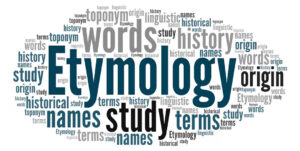The interesting origins of 10 everyday words

Etymology: the study of the origin of words and the way in which their meanings have changed throughout history.
I find the topic absolutely fascinating, not only looking at the origins of words in English but also in the languages I’m learning. Looking at etymology makes you realise how many links there are between languages and is a really fun way to learn about them!
Here are a few examples of the origins of everyday words in English. Channelling my inner Susie Dent!
1. Vaccine / vaccination
From the Latin word vacca (meaning cow). English physician Edward Jenner coined the term from his use of the cowpox virus to prevent smallpox. From here the concept of a vaccine was born!
2. Shampoo
This word entered the English language during the colonial era – it dates back to the 18th century and derives from a Hindi word meaning ‘to press, knead or soothe’.
3. Mortgage
Mortgage dates back to late 14th century French, with the roots “mort” meaning death, and “gage” meaning pledge. Interesting!
4. Plumber
If you know your periodic table, you’ll know that Pb is the symbol for the chemical element Lead. It makes sense, then, that the Latin word for lead is plumbum. The word then derives from old French plommier, originally denoting someone dealing in and working with lead.
5. Orangutan
Maybe not an everyday word, but certainly an interesting one! Orangutan originates from Malay, with orang meaning ‘person’ and hutan meaning ‘forest’.
6. Daisy
The word ‘daisy’ comes from an Old English word meaning ‘day’s eye’ – expressing how the flower opens in the morning and closes at night. How lovely! This one had to be included as one of our lovely Project Managers is called Daisy 😊
7. Companion
This word comes from Old French compaignon, literally meaning ‘with whom one eats bread’, based on Latin com- ‘with’ and panis ‘bread’. Conjures up a lovely image!
8. Amateur
Meaning a person who takes part in an activity, especially a sport, for pleasure and not for pay. The word came into English from French which in turn comes from the Latin for love – amare.
9. Language
This might be a bit more well known, but worth including as it’s what we are all about at Andiamo! The word is based on the Latin word lingua meaning ‘tongue’.
10. Happiness
Probably one of my favourites and inspired by one of the books listed below. A word once all about luck – from the root ‘hap’ meaning ‘fate’ or ‘chance’ (think perhaps, hapless, happen), happiness could be seen as being fortunate (favoured by good luck). The German word Glück also means happiness and luck.
Recommendations for further reading/ listening!
- Something Rhymes with Purple – podcast. Available to listen on Spotify here. Susie Dent and Gyles Brandreth invite you to enhance your vocabulary, uncover the hidden origins of language and share their love of words in this award-winning podcast, Something Rhymes with Purple.
- Interesting Stories About Curious Words: From Stealing Thunder to Red Herrings by
Susie Dent. A book for adults about the weird stories behind some of our most common words and phrases.
- Word Perfect: Etymological Entertainment For Every Day by Susie Dent. A linguistic almanac full of unforgettable stories, fascinating facts, and surprising etymologies tied to every day of the year.
- Roots of Happiness by Susie Dent. An utter delight of a book focused on positive words and the power of uplifting language.






